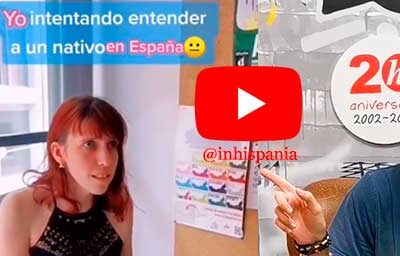Watch Out for False Friends in Spanish!
When learning a new language, we must be careful with false friends. These are words that look or sound very similar to words in our native language, which leads us to wrongly believe they mean the same thing.
While teaching Spanish to English-speaking students, I’ve noticed that these words can cause a lot of confusion, especially for beginners.
WHAT EXACTLY IS A “FALSE FRIEND”?
We use the term “false friend” to refer to words that are similar in spelling or pronunciation in two languages but have different meanings.
Students can easily fall into the trap of these false friends and end up saying something completely different from what they actually intended. For this reason, even though there are many Spanish words that share both form and meaning with English (like hospital, general, real…), it’s also important to learn false friends well to avoid confusion, awkward situations, and misunderstandings.
SOME INTERESTING EXAMPLES IN SPANISH
Librería
Example: Yesterday I went to the library to study ≠ Ayer fui a la librería para estudiar
In Spanish, librería means bookshop, so if you want to say library, you need the word biblioteca.
✅ Correct sentence: Ayer fui a la biblioteca para estudiar.
Emocionado/a
Example: I always cry a lot, I am very emotional ≠ Siempre lloro mucho, soy muy emocionado.
In Spanish, emocionado actually means excited. If you want to say emotional, you should use sensible.
✅ Correct sentence: Siempre lloro mucho, soy muy sensible.
Constipado/a
Example: My tummy hurts, I am constipated ≠ Me duele la tripa, estoy constipado.
In Spanish, constipado does not mean constipated — and this false friend can definitely cause misunderstandings! Constipado actually means to have a cold. If you’re trying to say you’re constipated in Spanish, the correct word is estreñido.
✅ Correct sentence: Me duele la tripa, estoy estreñido.
Embarazada
Example: I fell down in front of everyone, I was very embarrassed ≠ Me caí delante de todo el mundo, estaba muy embarazada.
This is one of the most famous false friends! In Spanish, embarazada means pregnant, not embarrassed. So saying this by mistake might really confuse your listeners. The word you’re looking for is avergonzada.
✅ Correct sentence: Me caí delante de todo el mundo, estaba muy avergonzada.
Letra
Example: I received a letter from England ≠ Me ha llegado una letra de Inglaterra.
In Spanish, letra refers to a letter of the alphabet (like A, B, C), or sometimes the lyrics of a song. But if you mean a letter that someone sends in the mail, the correct word is carta.
✅ Correct sentence: Me ha llegado una carta de Inglaterra.
Soportar
Example: We are going to watch a match to support our team ≠ Vamos a ver un partido para soportar a nuestro equipo.
In Spanish, soportar doesn’t mean to support — it means to tolerate or to put up with. This false friend often trips up English speakers. The correct word for to support in this context is apoyar.
✅ Correct sentence: Vamos a ver un partido para apoyar a nuestro equipo.
Mind these words!
Below is a list of more false friends in Spanish and English:
| SPANISH FALSE FRIEND | SIMILAR WORD IN ENGLISH | REAL MEANING IN ENGLISH |
|---|---|---|
| Actualmente | Actually | Nowadays |
| Advertir | Advertize | Warn |
| Campo | Camp | Field |
| Carpeta | Carpet | Folder |
| Colegio | College | School |
| Compromiso | Compromise | Commitment |
| Contestar | Contest | Answer |
| Decepción | Deception | Disappointment |
| Desgracia | Disgrace | Misfortune |
| Desierto | Dessert | Desert |
| Discusión | Discussion | Argument |
| Diversión | Diversion | Fun |
| Éxito | Exit | Success |
| Envolver | Involve | Wrap |
| Facilidad | Facility | Ease |
| Fábrica | Fabric | Factory |
| Lectura | Lecture | Reading |
| Molestar | Molest | Annoy |
| Pretender | Pretend | Intend to |
| Realizar | Realize | Perform / Make |
| Recordar | Record | Remember |
| Red | Red | Net |
| Remover | Remove | Stir |
| Restar | Rest | Subtract / Deduct |
| Sensible | Sensible | Sensitive |
| Terrorífico/a | Terrific | Terrifying |
There are many more false friends in Spanish. You can practice these words with your real friends and look for more examples! And if you’re eager to keep learning, check out this article on Spanish slang and colloquial expressions.😉



